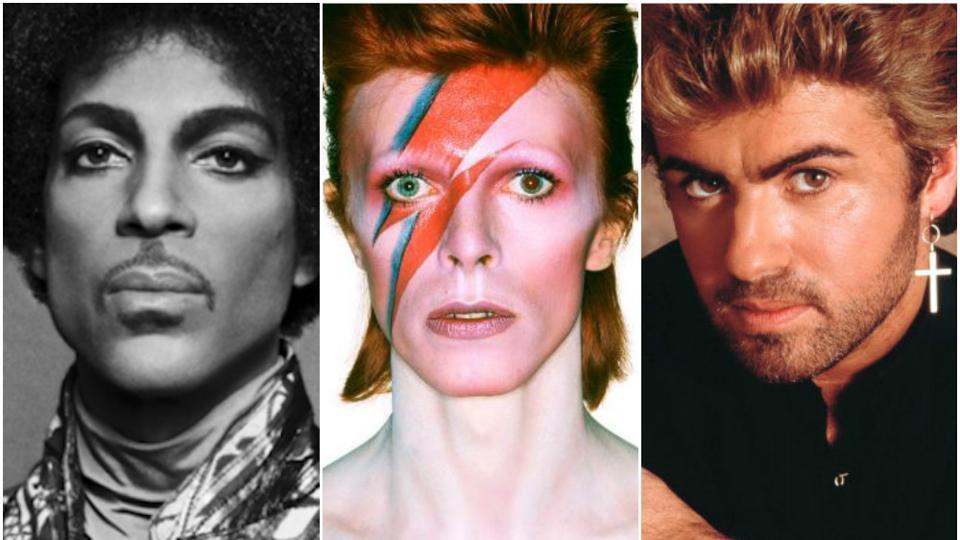2016 saw the world lose some of the greatest LGBTQ+ icons of all time. David Bowie, Prince and George Michael all crafted a legacy that incorporates much more than just their musical achievements: they were all revolutionary in challenging how we perceive concepts of sexuality and gender. There is no doubt that seeing such stars as these embrace their own identities had a positive influence on how the LGBTQ+ community was viewed, and their bravery still continues to promote tolerance today.
Prince’s style was profoundly influenced by concepts of gender. His onstage persona was flamboyant and colourful and in no way conformed to the stereotypes of masculine style. Importantly, this was never seen as embarrassing. Prince was so unapologetic in his performance that this challenging new style was not only tolerated but celebrated by music lovers around the world. It was a vital part of who Prince was as an artist. Prince challenged his fans further by juxtaposing this binary appearance with very masculine, sexually charged lyrics. Prince chose to explore sensuality with his music, explicitly and openly. These lyrics caused controversy in the media, which Prince responded to with the album Controversy. Artists are always pushing boundaries, but Prince took it to the next level and, due to his success, helped to spread the message that individuality is a good thing and that you don’t need to conform to what society deems normal for your gender.
David Bowie’s influence was similar in many ways. His style was also daring, flamboyant and often feminine. He wore more makeup than most women did and opened up an important discussion on sexuality and experimentation. Bowie had heterosexual relationships, but came out as gay in 1972, before stating he was bisexual a few years later, then claiming he was a “closet heterosexual”. Whatever his sexuality, it didn’t really matter. The unpredictable and unexplainable actions of Bowie were a landmark moment for the LGBTQ+ community. Bowie was coming out publicly only five years after homosexuality was actually made legal in Britain, when the stigma that surrounded it was still widespread. It was certainly a brave move on his part and forced many people to question their own prejudices. He was one of the biggest stars of the time and, because of this, had a huge influence on how gay people were perceived. Bowie never seemed to feel the need to justify his choices. He was intent on being himself, or some incarnation of himself. He pushed boundaries and changed the image of pop forever.
Unlike Bowie, George Michael’s coming out was, unfortunately, non-voluntary. He was outed by the press following an arrest in Los Angeles in 1998. The height of Michael’s career also coincided with the AIDS epidemic of the 1980s and 90s, which led to renewed prejudice of the gay community. Michael revealed that part of the reason he didn’t come out voluntarily was because he didn’t want his mother to worry about him contracting AIDS. George Michael was different to Bowie and Prince because, for want of a better term, he ‘looked straight’. He was the classic guys-want-to-be-him, girls-want-to-be-with-him celebrity. Despite there being other openly gay artists on the scene in the 1980s music industry, the news of George Michael being gay came as a shock to many people. Although in hindsight, the platforms, hair and earings might seem overtly flamboyant, he certainly never looked effeminate. He therefore helped challenge the image of what gay men look like and, like Prince, showed that how you dress and how you identify are not inextricably linked.
This LGBTQ+ history month, we should remember the lasting influence of those brave artists who helped change people’s perceptions of sexuality and gender. They used their fame to help society see that not everyone can fit the same mould of so-called ‘normality’. They not only made it acceptable to be different, they made it cool. Each in their own way helped all of those who are struggling with their own identity both then and today. In a time where the Vice President of the United States is a man who has previously stated that abstinence is the best response to the AIDS crisis, it is important to not become complacent towards LGBTQ+ rights. We need to remember how much society has progressed, and the struggles we have made millions of gay men and women and the trans community endure, in order for us to develop as an inclusive society together.
Katie O’Kelly
(Image: Hindustan Times)

